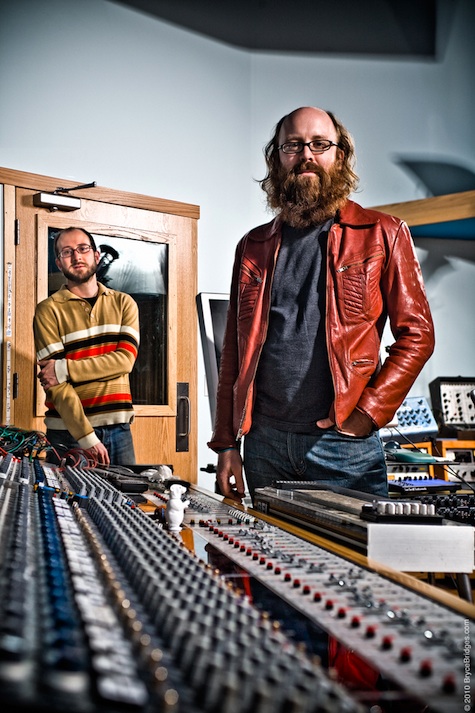
Mike and AJ Mogis. Photo by Bryce Bridges
The Mogis Brothers: Past, Present and Future
by Tim McMahan, Lazy-i.com
How important is the work of Mike and AJ Mogis? The brothers have been involved with every significant indie music recording produced out of Nebraska for the past 20 years. It’s that simple.
Along with Saddle Creek Records (which they were involved in creating), their studio work is a common denominator that runs through the entire story of Nebraska’s rise as an internationally known hub for indie music in the early 2000s. Glance at the liner notes for recordings released by Saddle Creek’s crown jewel triumvirate — Bright Eyes, Cursive and The Faint — and you’ll find one or both of the Mogis brothers’ names. From WhoopAss to Dead Space to Presto to ARC, their studios have been at the center of a conversation that goes beyond Saddle Creek to out-of-state national bands that are now their bread and butter.
During a 90-minute interview in the control room of ARC’s Studio A, the Brothers Mogis talked about the past, present and future, in a world where technology is making recording studios obsolete.
Their story begins in North Platte, Nebraska, where at the age of 2 (Mike) and 4 (AJ) the brothers moved after their father purchased a Chevy dealership there. It was in the basement of their family home that they first began tinkering with recording equipment as an offshoot of being in bands in high school.
“Mike and I had this band called Inside I,” AJ recalled.
“It was kind of a Rastafarian thing,” Mike added.
“Which the band didn’t sound anything like,” AJ interjected. “It was a Bad Brains thing, but we recorded at Studio Q in Lincoln, and seeing that process opened our eyes that it was something we could do. In addition to that, we got American Musical Supply catalogs in the mail that sold home recording kits. We were like, ‘Hey, we could do this. This could be really fun,’ and we just pulled our money and bought an 8-track set-up and started recording ourselves.”
The earliest recording in the All Music Guide that lists the Mogis brothers is Fun Chicken, released on Dan Schlissel’s Ismist label in 1994. It’s not something either recommends you seek out.
“(Fun Chicken) was like a high school Mr. Bungle sort of joke band,” Mike said. “It was recorded in ’92 or ’93. Prior to that we had been recording stuff on cassette decks using a RadioShack mixer. Then I got a four-track by working at the car dealership when I was 15 or 16. Then we bought the 8-track reel-to-reel that the epic Fun Chicken was dialed in on.”
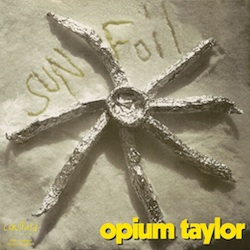
Opium Taylor "Sun Foil" b/w "Livin'" (Caulfield, 1994)
That 8-track recorder, which the brothers still have and use, became the centerpiece of WhoopAss, their first recording studio, located in the basement of their parents’ North Platte home. In addition to that Fun Chicken debut, the Mogis Brothers recorded the first single by Opium Taylor at WhoopAss — a band that included Mike Mogis, Matt Focht, Pat Noecker and Chris Heine. “Recordings done to eight tracks January 1994 in North Platte, NE. Engineered by AJ Mogis. Mixed by Opium Taylor and AJ Mogis at WhoopAss,” says the liner notes for “Sun Foil” b/w “Living,” released on Lincoln’s Caulfield Records.
“Oli Blaha of Polecat named the studio,” Mike said. “We brought the band out to record, and he said, ‘You sure opened up a can of WhoopAss,’ or something like that. When they needed to put a credit on their cassette tape, someone called the studio ‘WhoopAss.’ The name stuck.” Polecat, which is reuniting for a show at Slowdown Dec. 23, also included Boz Hicks and singer-guitarist Ted Stevens. Another North Platte recording was Superglue, a band that included Ben Armstrong and Mike Elsener, who would go on to form Head of Femur, and Ben McMann.
Raw and reckless, each of those early recordings was a learning experience for the brothers. “We never learned how to record aside from just doing it,” Mike said. “We never went to (recording) school.”
But it was a school that drew them from North Platte to Lincoln, where they attended University of Nebraska-Lincoln and met most of the characters that would become part of Saddle Creek Records, including label chief Robb Nansel, Ted Stevens and Tim Kasher. Lincoln also was where the brothers’ next band, Lullaby for the Working Class, formed.
“Lullaby was a project that we did just for fun,” Mike said. “Ted (Stevens) played me some songs and said, ‘I want to do something different, acoustic.'”
“Everyone was very much ‘punk rock’ back then,” AJ said.
“Emo as well,” said Mike. “The idea was, ‘This would be a fun little experiment, making acoustic indie rock.’ We recorded four songs in ’94, right after Ted moved out of the dorms into his apartment. (The tracks) didn’t see the light of day for a couple of years. We didn’t make it a real band until a few folks had heard it and gave us some encouragement.”
By then, WhoopAss had moved to a different basement, in Lincoln. And while the brothers had gained regional attention recording bands like Giant’s Chair, Boy’s Life, Christie Front Drive, Sideshow and The Get Up Kids, Lullaby for the Working Class was the first band that garnered international attention with the 1996 release of Blanket Warm on Bar/None Records.
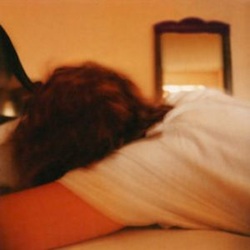
Lullaby for the Working Class, Blanket Warm (Bar/None, 1996)
“I don’t think about that time much anymore,” Mike said. “It was very formative, though. It instilled a good work ethic. Before the Internet, if you wanted to get a gig, you had to call and send a fucking tape. You didn’t e-mail; there were no cell phones. I was sending out Lullaby cassettes to get a gig in Iowa City. You really had to work at shit. I sound like an old-timer. I guess I am, I’m 36. This plays into the ever-changing landscape of music, especially independent music, which is everything now.”
By 1998, WhoopAss Studio had changed its name to Dead Space. “It was the transition to a ‘real studio,'” AJ said. “It was where we had a real console and Pro Tools, but everything was still in the basement. That didn’t last very long, because we moved to the 19th and ‘O’ location and renamed it Presto.”
It was the summer of 2000. “We had bought a 2-inch machine that we couldn’t get into our house,” Mike said. “So we ended up storing it in Omaha at Studio B, and did some recordings up there and went band and forth. It was such a pain in the ass. I remember going on a Bright Eyes tour and coming back and seeing a For Rent sign in a window in town that I knew used to be a studio that was being built by a guy with the lofty goal of making it the best in the Midwest.”
But because of personal and financial issues, that guy never finished the studio, and had to give up the building. “We moved in there amicably and bought some gear from him and said we’d finish it for him,” Mike said.
And that’s exactly what they did. Located on the very edge of downtown Lincoln, Presto was just a stone’s throw from the Foxy Lady strip joint on “O” St., a non-descript white building that went unmarked except for an ornate “Open” sign and the address in the front-door window. It was where I first met the Mogis Brothers in 2001 while they were recording Austin band The Gloria Record.
“It was probably our most creative time,” Mike said.
“There were a lot of things to learn,” AJ added.
“I still feel like I learn something and get slightly better at what I do, that hasn’t stopped,” Mike added, “but back then, it was more exponential growth. It was exciting.”
“I also remember being really busy because we were the only studio in Lincoln at the time,” AJ said. “Studio Q had closed, and the whole basement studio thing hadn’t taken off the way it is now.”
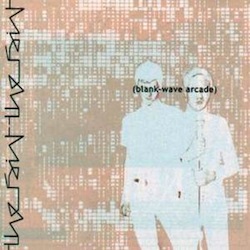
The Faint, Blank-Wave Arcade (Saddle Creek Records, 1999)
From the late ’90s through early 2000s, the Mogis Brothers produced some of the most important recordings in the Saddle Creek catalog. AJ recorded The Faint’s Blank-Wave Arcade in ’99 while Mike is credited for 2001’s Danse Macabre. Both Mike and AJ worked on Cursive’s breakthrough album, 1999’s Domestica. How well the two worked together depends on who you talk to, although neither can remember arguing in the studio… at least not very much.
“Me, personally, I would not argue, but I’d say what I was thinking,” Mike said. “We would work together on Lullaby records and earlier records like Commander Venus, where AJ was the engineer, and I was just helping and learning. In our professional adult lives, I don’t view us as being argumentative. The only times I can recall is Lullaby, where I could sometimes be, not stubborn, but assertive.”
AJ said he didn’t remember any conflicts between the two of them. “There were times when you would get mad at the band, The Faint or something, and I would come in and smooth the waters,” Mike said. “I had the ambassador role. Domestica was one of the first ones I tried to do by myself. The Bright Eyes stuff I did myself as well. Bright Eyes was my learning curve tool, fromLetting Off the Happiness, that’s how I learned how to record.”
Mike would go on to record all of the Bright Eyes albums, eventually becoming a permanent member of the band with 2007’sCassadaga. Through the years, there has been speculation as to Mike’s role in creating those early records. While there’s no question that Oberst wrote all the songs, just how much influence did Mogis have on the final product? Was he The Great Oz pulling the strings behind the curtain, especially considering that Oberst’s musicianship was questionable back then?
“He jokes about having the best right hand in the business — all he can do is strum a guitar,” Mike said. “But back then he couldn’t even really do that. He was really shaky. Now he’s a very solid musician and plays a lot of keyboards and is really good at it. Back then he gave me a lot of leeway.”
AJ remembers finding musicians to fill in the blanks. “There was always people saying, ‘Hey, we need a clarinet on this thing,’ and we’d find someone who knew how to play clarinet.”
“Those Bright Eyes recordings and Lullaby as well are the reason why I learned a lot of instruments,” Mike said. “I thought ‘I’d like to hear banjo here,’ and I’d go find one. Same with mandolin and pedal steel guitar, which I still never learned, but know how to play. Same with recording — there’s intuition to almost everything aside from physics. Music is very intuitive, every step of the process, if you have the ability.”
Early in the Presto years AJ’s role at the studio changed. “I bowed out at the point where I needed to focus on my electrical engineering degree,” he said.

Superglue, "Circles" "Ball" b/w "Violet Secorah" "<3<3<3" (Novelty Yellow)
“So basically I took over managing the day-to-day recoding opportunities,” Mike said. “After that I did three or four Cursive records in a row, and he did the newest one, so it still switches up. It’s not like there’s one exclusive person, it’s just during the period where everybody was getting attention, I was doing all the recording.”
The rise of Saddle Creek’s status came as a surprise to some, but not the Mogis brothers.
“I wasn’t surprised at all,” Mike said. “I liked that music, and at that time it was some of the best stuff people were putting out. The Faint were cutting edge. Cursive had a great blend of good songwriting and storytelling, powerful rock grooves. With Bright Eyes, the songs that Conor was writing rivaled music anyone was making at that point in time. All of that was happening in Nebraska — three totally different sounds in the same group of friends and scene — the power rock of Cursive, the dance rock of The Faint and the, whatever, sorry emo folk, poor whiney kid… I’m just kidding, but with Bright Eyes, those three sounds getting national attention, I wasn’t surprised, and I wasn’t being biased.”
It was during the height of the Saddle Creek hype that Mike Mogis considered moving to Los Angeles. “I had an offer,” he said. “A guy was willing to relocate me out there and set up a studio, but it didn’t pan out because it cost so much money.”
Instead, in 2006 Mike built ARC Studio — which stands for Another Recording Company. The complex, located on the edge of Fairarcres, includes Mogis’ family residence, a house for visiting bands and the studio facility. It was Mike’s wife, Jessica, who found the compound online. “She forwarded me the listing and thought it would be perfect,” Mike said. “It was listed for $1.2 million, well beyond what it was worth. I gave them what I considered to be a complete lowball offer and they took it, and then lowered it a little bit more after the home inspection, and they took that, too. They just wanted the fuck out.”
To pay for it, Mike got a loan from Saddle Creek Records (which he’s already paid back), and through a bank. “There’s no reason I should have gotten the loan I got for this place,” he said. “I haven’t paid it off obviously, but I make my mortgage payment and I plan on doing it until I pay it off. I don’t have that much money because pretty much everything I make goes to the mortgage.”
It was money well spent. Go to anotherrecordingcompany.com — the studio’s website — for the full equipment rundown of both Studio A and Studio B, which is essentially a replica of Studio A but smaller and without Control Room A’s crown jewel — a Neve 8048 console that was custom built by Rupert Neve for George Martin — yes, that George Martin.
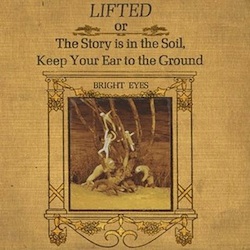
Bright Eyes, Lifted, or the Story's in the Soil... (Saddle Creek, 2002)
Mike said he put a “feeler out” for a Neve board with 1081 modules “because they’re the best Neve EQs ever made, which would rival the best EQs ever made,” he said. “The company I bought most of our gear from had bought a guy’s personal studio in Santa Barbara, including one of 13 boards commissioned by George Martin. There’s nothing special about it, but it was made for him for Air Studios in Lyndhurst. I have two pictures of him at the board. The layout is the same, but it’s been refurbished. There are only a few in the world like it with its center section. There’s one at Capitol Studios, and that’s one of the elite studios in the world. This facility has the goods to compete with anybody.”
The business comes mostly through word of mouth and on the strength of Mike’s reputation as a producer. “I don’t really advertise,” Mike said. “I don’t even list it as a commercial studio. It’s in my back yard. I have a family. I don’t want people just rolling up to my house with ‘I heard there’s a studio here.’
“It’s not even really profitable,” he added. “I’m not running a recording studio to make money. I’m trying to keep it maintained, really. I like to break even, and that’s what we do. The insurance, the property tax, all of that shit is expensive. I have a studio because I play in a band. That’s essentially why we started recording music, and my main interest is trying to keep making myself interested in music.”
Still, Mike said the key to keeping the studio afloat is having two recording rooms. Mike primarily uses Studio A, while AJ, who no longer is a part owner in the studio after Mike bought out his share of the business, books Studio B as a freelance producer, though anyone can book either room if it’s available. “We’ve lowered the rates to make it more affordable for bands,” Mike said. “It’s been fairly slow, but a few projects a month that come in pays the bills.”
The guest house for visiting bands is an obvious attraction. “I like local music, but getting out-of-town bands is really the key to our success,” Mike said, “not recording local bands.”
Bands like Jenny and Johnny, who recorded their debut album at ARC this past February. Despite being on Warner Bros., Jenny Lewis paid for the sessions herself. In the case of Philadelphia band Man Man, who recently wrapped up recording at ARC, the band’s label, Anti Records, paid for the sessions. While AJ’s current project in Studio B, Des Moines band Envy Corp, is paying its own way.
“Now more than ever, bands are not looking for major labels to support art, they want to do it themselves so they can have a more autonomous role over their careers,” Mike said.
“At the end of the day, bands who pay as they go own the recordings,” AJ added, “With most major-label deals, you don’t own the record.”
“Bands just want to find some place to get their music recorded cheap, and then they can license it to a label,” Mike said.
That’s part of what’s driving the move to home studios. Suddenly anyone with a laptop and a few hundred dollars in software can make a respectable recording if they know what they’re doing. Ironically, it was the initial shift to digital recording technology that allowed the Mogis Brothers to get started.
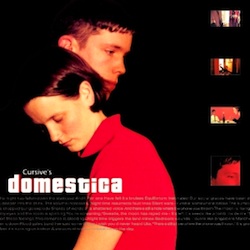
Cursive's Domestica (Saddle Creek, 2000)
“I wouldn’t be sitting here in my own recording studio if wasn’t for the technology,” Mike said. “The ’80s were the glory days of recording studios. To open a studio in ’80s you needed $200,000 to buy the DASH Digital Recorder and the board and all that stuff. But in the ’90s ADATs and D88s were undermining the big recording studios, and that’s how we got into it, and that’s exactly how these kids are doing it now. We had to invest ten grand into some recorders and a Mackie Board. You still had to buy the compressors, the board, the recorder, now all of those devices are in your laptop. And I don’t see it as bad thing.”
“It’s been going on for a while, the democratization of the technology and the ability to make records,” AJ said.
“To some degree, it’s made records a little sub par, even starting in the ’90s,” Mike added. “If you go back to the stuff in the ’60s and ’70s, the musicianship and the tones, you can’t beat that stuff. Technology’s been a blessing and curse.”
But just how good are home recordings? “I remember reading a thread on a discussion board about what was needed for a good home studio,” AJ said. “One guy said, ‘I was just working with Marc Riboud with an SM57(microphone) and an MBox (Pro Tools personal studio), and it was amazing.”
“If you have talent, you can fucking open up your iPhone and make a good recording,” Mike said. “It depends on who’s doing it. You can make a great recording at home.”
But doesn’t that threaten studios like ARC? Not at all, they said. “There is a certain set of skills that an engineer or producer brings to the table,” Mike said. “There’s no ‘Mike Mogis plug-in’ that can get that pedal-steel sound or drum sound or guitar sound. As long as I can maintain a level of quality with the work that I do and push myself to make as good a record as I can, I feel like it’s going to be OK.”
A bigger threat to traditional studios, AJ said, is the breakdown of the economy of the music business in general. “There aren’t budgets the way there used to be,” he said. “There’s just less revenue for recording, whether it’s due to the record labels not selling as many albums or the fact that they’re tied to these major corporations that are losing money in other ways.”
The iPod generation doesn’t appreciate the quality difference between a home recording and a studio recording anyway, Mike said. He pointed to the new Maroon Five album, recorded in a studio, and the most recent Vampire Weekend album that was recorded in a home studio. Both are equally as popular.
“Fundamentally, I think people just want good songs and want to be moved by something, and you can do that outside of a studio,” Mike said, adding that Simon Joyner’s early low-fi albums “are still in my memory as classic records.”
“If the song is awesome and the performance is awesome, the recording quality doesn’t matter because people will love it,” AJ added.
“And it’ll be around forever,” Mike said. “That’s what I try to focus on, and I find myself sometimes frustrated because to me it’s not about technology, it’s about trying to get music to mean something and be relevant to me, and hopefully other people.”
That’s certainly what he’s finding with his current project — the next Bright Eyes album that Mike said has sprawled out over several months. “I’m supposed to be finishing one of the last songs today,” he said.
After the Bright Eyes album is released next year, Mike said he’ll be on the road touring with Bright Eyes for year and a half. “We’re going to take breaks, and I hope to do little things during those breaks, but it’s hard to plan,” he said. “When I get back, I hope I still have a job.”
Published in The Omaha Reader Dec. 1, 2010. Copyright © 2010 Tim McMahan. All rights reserved. Photo by Bryce Bridges, used with permission.
* * *
Read Tim McMahan’s blog daily at Lazy-i.com — an online music magazine that includes feature interviews, reviews and news. The focus is on the national indie music scene with a special emphasis on the best original bands in the Omaha area. Copyright © 2010 Tim McMahan. All rights reserved.
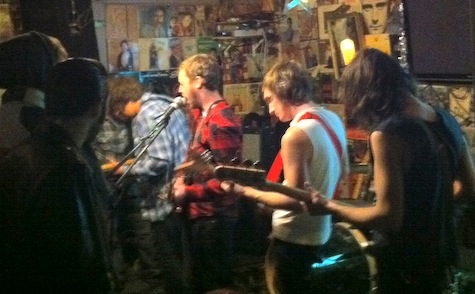




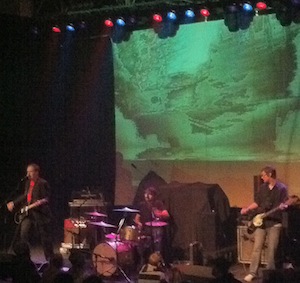







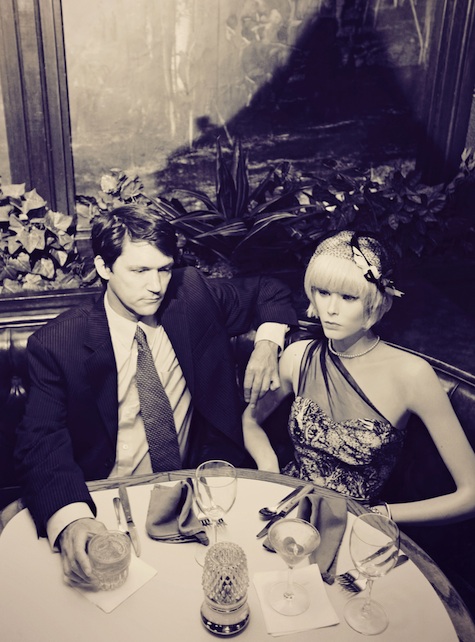
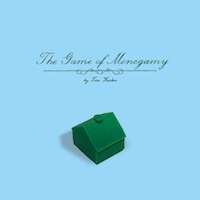
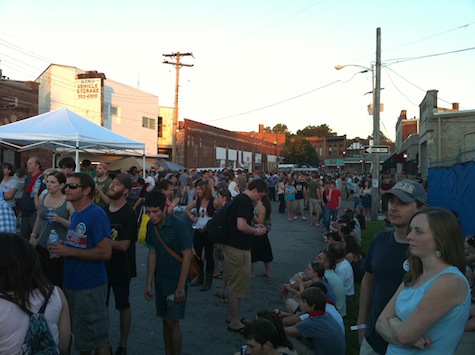
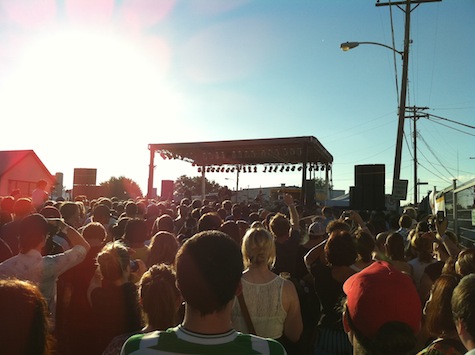
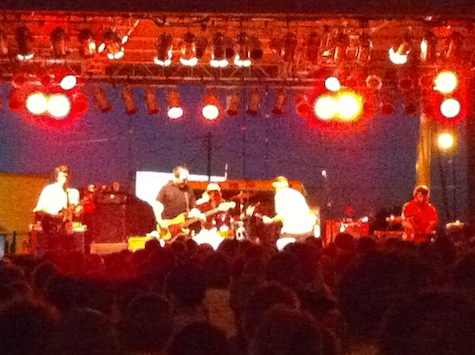
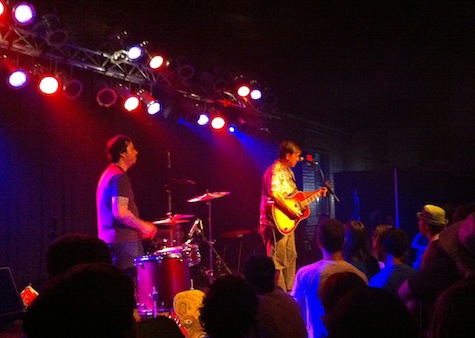
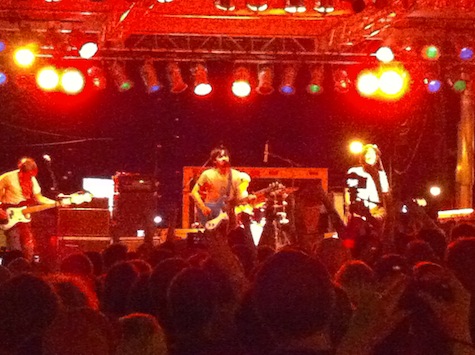
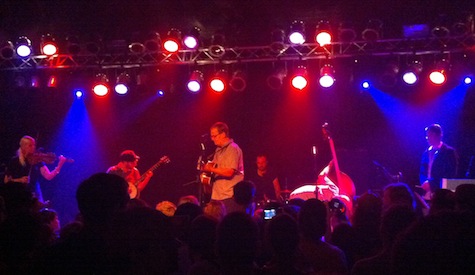
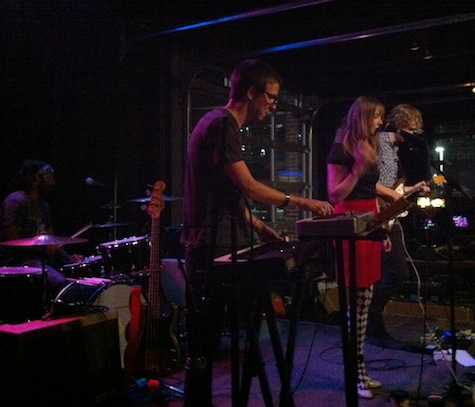
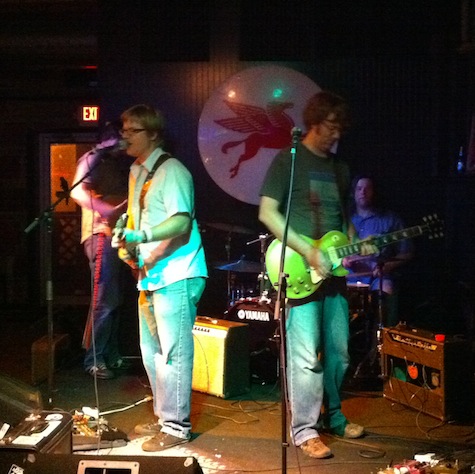
Recent Comments